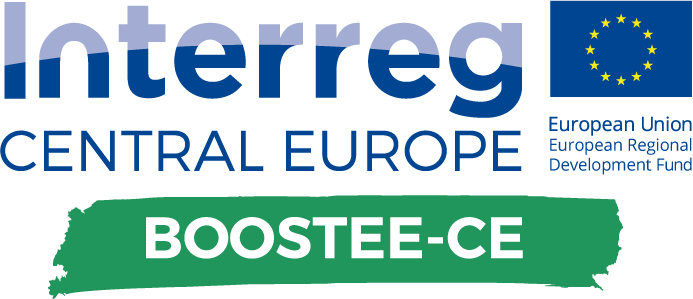Capitalized Projects
BOOSTEE-CE
The BOOSTEE-CE project aimed to improve the governance of energy efficiency in existing public buildings and, ultimately, to reduce energy consumption. It intended to tackle these territorial challenges offering innovative solutions and best practices to undertake actions for improving energy performance of buildings and accelerate the transition to low-carbon cities.
Capitalized TARGET-CE solutions will support the public sector challenges in playing an exemplary role in undertaking EE actions and upgrade their infrastructures.
PANEL 2050
PANEL 2050 is a project financed from Horizon2020 Programme. Its main output was to create sustainable energy network at local level, where stakeholders collaborate for the creation of energy strategies for the transition towards low carbon communities in 2050. Panel 2050 multi-stage strategy for implementing solutions, will be used to prepare 9 action plans for public utilities. Those solutions will support the smooth conduct of pilot actions in all regions of TARGET-CE project.
EMPOWER
EMPOWER is a project financed from Interreg Europe programme, which main output is improving governance to mobilize new projects that apply energy monitoring with usage of innovative financing mechanisms and new technology. EMPOWER Good Practice Register is a database on good examples of projects related to energy monitoring and innovative financial instrument, which will help improve the action plans carried out in TARGET.
ENERGY@SCHOOL
ENERGY@SCHOOL project worked on increasing the capacity of public sector to implement Energy Smart Schools. This was done by an integrated approach which brought together education of schools staff and pupils. They became Junior and Senior Energy Guardians. In their new roles they learnt more about energy efficient measures, gained more responsibilities and experienced the implementation of technical energy efficient solutions, facing the shift towards low carbon Europe every day.
ECENTRAL
The eCentral project offered support to key stakeholders to realize the benefits of the standard for the renovation and construction of public near-zero-energy buildings. The main results of the project were targeted at regional and local public authorities that do not have sufficient technical and financial knowledge to develop complex energy efficiency projects. The experiences will be upgraded and continued in the TARGET project, which will collect, adapt and use new ICT tools, financial models, action plans and trainings.
FEEDSCHOOLS
The project aims to provide local authorities with new solutions, both technical and financial, which will help them to implement ‘nearly Zero Energy Building’ (nZEB) renovation activities in schools. The innovative approach consists in developing a transnational and holistic support toolkit and a web database of innovative best practices for nZEB renovation. Activities: Development of energy reviews of representative school facilities, preparation of preliminary plans for renovation of representative school facilities, emissions after renovation, etc.
CITIENGOV
The CitiEnGov project has contributed to improve the capacities of Central Europe Public Authorities, especially Municipalities, in dealing with energy planning and strategies. Moreover it has promoted an innovative approach for organizing and managing the energy topic within local administrations, which is based on a integrated and horizontal structure, easing the public administrations’ processes. The results will be deepened during the TARGET-CE project. Also the CitiEnGov wiki-toolkit will be integrated and enhanced with OnePlace platform.
GREENSOUL
The GREENSOUL project aimed to surpass the energy saving targets of the EU Energy Efficiency Directive (-20% by 2020) with a cost-effective and energy-efficient ICT platform. This ICT platform is equipped with a number of tools and a socio-economic and behavioural model that will jointly guide the energy consumption practices of public buildings.








